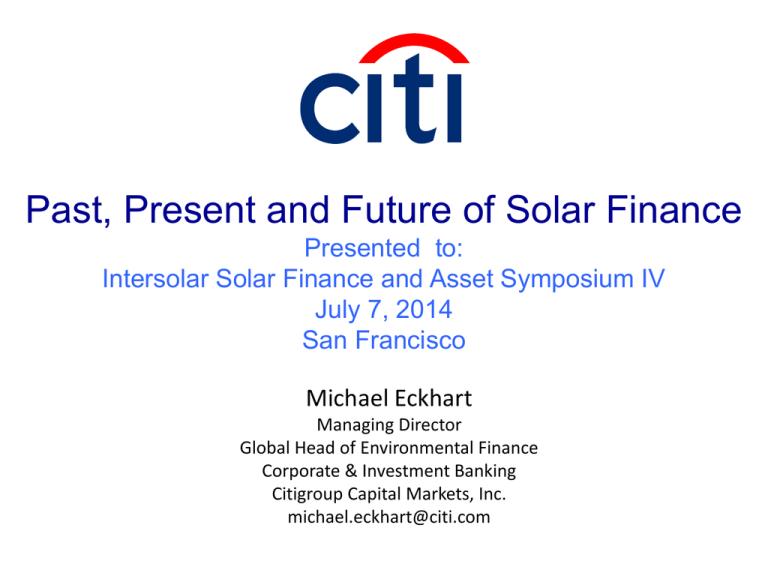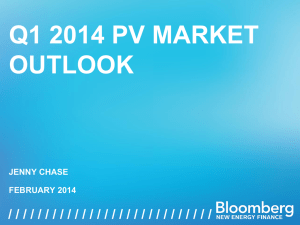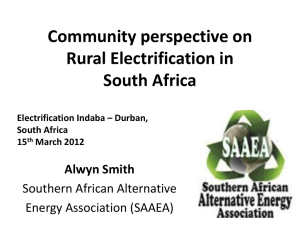
Past, Present and Future of Solar Finance
Presented to:
Intersolar Solar Finance and Asset Symposium IV
July 7, 2014
San Francisco
Michael Eckhart
Managing Director
Global Head of Environmental Finance
Corporate & Investment Banking
Citigroup Capital Markets, Inc.
michael.eckhart@citi.com
PERSPECTIVE
1839-1959: Invention of PV
1839:
• Photovoltaic effect first observed in science by Edmond Becquerel, Paris
1888:
• Edward Weston receives first US patent for "solar cell"
1922:
• Nobel Prize awarded to Albert Einstein for his 1905 mathematical
explanation of the photovoltaic effect
1954:
• Bell Labs produced the first functioning solar cell
1959:
• NASA launched Vanguard 1, the first spacecraft using solar PV (still in
orbit!)
1973-1976: Oil Crisis and OECD Reply
1973:
• Ford Foundation Study: “solar and efficiency” by David Freeman
• “Solar Energy in the Service of Mankind”, Paris: Wolfgang Palz
• Solarex founded by Peter Varadi and Joe Lindmeyer
• Arab oil embargo
1974 -1976:
• International Energy Agency IEA)
• Federal Energy Administration (FEA)
• Energy Research & Development Administration (ERDA)
• Congressional Solar Coalition, Scott Sklar
• Oil industry begins investing in solar PV development:
– ARCO
-- Texaco
-- Chevron
– Exxon
-- Shell
-- Mobil
1977-1979: U.S. Government Action
1977:
• DOE founded by merger of agencies: FEA, ERDA, NASA Solar, Coal research
• Solar Energy Research Institute (SERI) established in Golden, CO
• DOE sets PV cost goal = 50¢/Wp ($1976)
1978:
• PURPA enacted: creating Qualifying Facilities (QFs)
• Energy Tax Act created the first business tax incentives for solar, leading to
first leasing structures –Keith Martin, Chadbourne & Parke
• BAH study for the White House: “Assessment of Solar PV Technology,
Industry and Policy”: Eckhart et al
1979:
• ARCO Solar produces 1 MW of PV in one year
1979-1989: The Lost Decade
1979:
• Iranian hostage crisis and oil price increase
1980:
• Ronald Reagan elected; beginning of major cutbacks in Federal funding
1983:
• Solarex acquired by Amoco, commercial applications for PV
1985:
• Solar tax credits allowed to lapse
1986
• Oil and gas prices collapse
1990-1996: Rebirth of Renewables
1990:
• SERI renamed NREL
1992:
• EPAct1992: EWGs and wind PTC
• Aachen Model, Germany – precursor to the FIT
• SELF founded by Neville Williams
1995:
• Founding of Nth Power, first VC in renewables, by Nancy Floyd
• Founding of E+Co, the Rockefeller-funded finance fund for SMEs
1996:
• World Bank-Rockefeller joint task force on Solar Financing
1997-1999: Kyoto and EU White Paper
1997:
• Kyoto Protocol
• European “White Paper on Renewable Energy” by Wolfgang Palz
• World Bank hosts “Village Power” conference
1998
• SolarBank Initiative in South Africa, Mike Eckhart, Reinhold Viljoen, Sake Kotse et al
• SolarBank Initiative in India: training 1,000 bankers by Mike Eckhart, Griff Thompson,
Harish Hande, KM Udupa, Rahul Arora, Aesha Grewal
• German 100,000 roofs program, Hermann Scheer
• California AB 32 solar subsidy
1999:
• First RPS in Texas for 2,000 MW of wind power
• Founding of the Shell-Eskom Solar Energy Co. in South Africa using pre-payment
• Siemens Solar achieves 100 MW produced – announces 25-year warranty
2000-2001: Stage-Setting
2000:
• German FIT for solar PV plus KfW solar loan program – Hermann Scheer
• EU Publishes “Take-Off for Renewable Energy”
• Net Metering
• PowerLight hires Greg Rosen, first full-time financier of solar
2001:
• ACORE founded, Mike Eckhart, Scott Sklar, Dan Reicher, Michael Ware, John
Mullen, Mark Riedy, Hank Habicht and many others.
• 9/11
• Enron bankruptcy - ending of utility restructuring
2002:
• Solar leasing offered by Stella Group – Scott Sklar
• Rio+10 meeting in Johannesburg: renewables blocked
2003-2005: Policy for Financing
2003:
• First REFF-Wall Street – repeated annually since then by Mike Eckhart, Ken Locklin,
Dan Reicher, Michael Ware et al
• New Energy Finance founded, Michael Liebreich
• SunEdison founded – PPA model for rooftop solar, Jigar Shah
2003-2004:
• German 20-year FIT for all renewables, Hans Josef Fell et al
2004:
• Bonn Renewables 2004 – Gerhard Schroeder, Jurgen Trittin, Hermann Scheer
• Increasing RPS in the US
2005:
• Increased VC investment: John Doerr at KPCB, Stephan Dolezalek at VPCP, Raj
Atluru at DFJ, Erik Strasser at Mohr Davidow, Nancy Floyd at Nth Power, plus NEA,
others
2006-2007: China and California
2006:
• China enacts Renewable Energy Law: Li junfeng
• California Solar initiative: $3 billion over 10 years
2007:
• SolarCity, SunRun, Sungevity founded
• Sale-leaseback financing of a utility-scale PV project for SunEdison, Keith
Martin, Chadbourne & Parke
• Inverted Lease for resi-rooftop created by US Bank and Morgan Stanley:
Marshal Salant and Jason Cavaliere
• First solar set-aside established in the Colorado RPS
2008-2009: Financial Crisis/Incentives
2008:
• WIREC 2008 world meeting by ACORE, Mike Eckhart, Jim Connaughton,
Reno Harnish, many others
• Partnership flip financing by SunEdison
• Financial crisis: Lehman Bros bankruptcy
• ERRA: 30% ITC for 8 years, Rhone Resch; beginning of the new era of tax
equity for solar
2009:
• IRENA founded
• $*9 Billion ARRA with cash grant, loan guarantees and R&D funding
• EU enacts 20/20/20 by 2020
• CPF Founded: Nat Kreamer
2010-2011: Loan Guarantees
2010:
• China has 523 companies manufacturing solar PV, begins
dropping prices
• RBF convenes off-site to advance FITs to the US: Michael
Northrop, Craig Lewis
2011:
• Fukushima nuclear power accident in Japan
• ARRA loan guarantees awarded for CSP to BrightSource,
SolarReserve and Abengoa
• ARRA loan guarantees awarded for PV to First Solar,
SunPower, Cogentrix
• $2.3 billion Desert Sunlight financing with first solar project
bonds by Citi, Stuart Murray et al
2012-2014: Capital Markets
2012:
• Japanese FIT enacted
• China PV installation program enacted
• SolarCity IPO: Lyndon Rive, Bob Kelly, Ben Cook et al
• Solar Mosaic founded creating first crowd funding: Daniel Rosen and Billy Parish
• SAPC founded by NREL: Michael Mendelsohn
• Birth of Community Solar – cooperative financing
2013:
• First REIT: Hannon Armstrong Sustainable Investment IPO: Jeff Eckel
• First solar securitization by SolarCity: Credit Suisse
• First Yieldco by NRG, David Crane working with Citi
• TruSolar founded by Distributed Sun: Chase Weir, Jeff Weiss, Doug Payne
• “Banking on Solar” founded
2014:
• Green Bond Principles developed by Citi and BAML and adopted by over 50
banks, investors and issuers: $20.5 Billion issued YTD.
Summary: Phases of Innovation
1970 - 2020
Environmental Policy Innovation
Clean Air Act
Kyoto
EPA
Technology Innovation
ERDA / USDOE
ARRA RD&D Funding
Market Structure Innovation
PURPA
EPAct 1992
RE Policy Innovation
FIT, Net Metering, RPS, tax credits
Financial Innovation
LG, CG, ITC, Interest Rates
1970
1980
1990
2000
2010
2020
Global Solar PV Global Installations
2007-2015
(GW/Year) 46.3
ROW
India
36.3
30
30.5
China
US
18.2
6.6
Japan
7.7
2.8
2007
EU
2008
Western Europe
2009
2010
2011
Eastern Europe
Japan
Source; BNEF 2013
2012
US
2013
China
India
2014
2015
Rest of World
U.S. Solar PV Installations 2006-2013
(S Millions)
Utility-Scale
Small-Scale
Future of Solar Finance:
Near-Term Drivers
Drivers trending towards solar:
• Global markets driving down hardware costs
• Interconnection and permitting
• Grid and distribution system upgrades
• Storage
• Continued PV technology advancement and cost reduction
Drivers trending away from solar:
• ITC and other direct supports
• Net metering and resolution of utility rates
• Interest rates
Future of Solar Financing:
Long-Term Drivers
Drivers trending towards solar:
• Global market pull on PV success
• Power economics with environmental and climate costs
• Public attitudes on climate and environment
• Public acceptance of solar
• Infusion of climate policy in utility decision making
Drivers trending away from solar:
• None
Future of Solar Finance
Continued innovation:
• Easy credit for residential rooftop
• Credit backstop mechanisms for C&I financing
• Portfolio financings for substation-level projects
• Risk mitigation and credit enhancement
M&A and consolidation:
• Solar installation companies
• Solar financing companies
Scale-up of issuances to the capital markets:
• Solar securitizations
• Yieldcos – Carve-outs, Newcos, REITs, and maybe MLPs
• Green bonds and the return of balance sheets
Thank You
Michael Eckhart
Managing Director
Global Head of Environmental Finance
Corporate & Investment Banking
Citigroup Capital Markets, Inc.
michael.eckhart@citi.com
IRS Circular 230 Disclosure: Citigroup Inc. and its affiliates do not provide tax or legal advice. Any discussion of tax matters in these materials (i) is not intended or written to be used, and cannot be used or
relied upon, by you for the purpose of avoiding any tax penalties and (ii) may have been written in connection with the "promotion or marketing" of any transaction contemplated hereby ("Transaction").
Accordingly, you should seek advice based on your particular circumstances from an independent tax advisor.
In any instance where distribution of this communication is subject to the rules of the US Commodity Futures Trading Commission (“CFTC”), this communication constitutes an invitation to consider entering
into a derivatives transaction under U.S. CFTC Regulations §§ 1.71 and 23.605, where applicable, but is not a binding offer to buy/sell any financial instrument.
However, this is not a recommendation to enter into any swap with any counterparty or a recommendation of a trading strategy involving a swap. Prior to recommending a swap or a trading strategy involving
a swap to you, Citigroup would need to undertake diligence in order to have a reasonable basis to believe that the recommended swap or swap trading strategy is suitable for you, obtain written
representations from you that you are exercising independent judgment in evaluating any such recommendation, and make certain disclosures to you. Furthermore, nothing in this pitch book is, or should be
construed to be, an offer to enter into a swap.
Any terms set forth herein are intended for discussion purposes only and are subject to the final terms as set forth in separate definitive written agreements. This presentation is not a commitment to lend, syndicate a
financing, underwrite or purchase securities, or commit capital nor does it obligate us to enter into such a commitment, nor are we acting as a fiduciary to you. By accepting this presentation, subject to applicable law or
regulation, you agree to keep confidential the information contained herein and the existence of and proposed terms for any Transaction.
Prior to entering into any Transaction, you should determine, without reliance upon us or our affiliates, the economic risks and merits (and independently determine that you are able to assume these risks) as well as the legal,
tax and accounting characterizations and consequences of any such Transaction. In this regard, by accepting this presentation, you acknowledge that (a) we are not in the business of providing (and you are not relying on us
for) legal, tax or accounting advice, (b) there may be legal, tax or accounting risks associated with any Transaction, (c) you should receive (and rely on) separate and qualified legal, tax and accounting advice and (d) you
should apprise senior management in your organization as to such legal, tax and accounting advice (and any risks associated with any Transaction) and our disclaimer as to these matters. By acceptance of these materials,
you and we hereby agree that from the commencement of discussions with respect to any Transaction, and notwithstanding any other provision in this presentation, we hereby confirm that no participant in any Transaction
shall be limited from disclosing the U.S. tax treatment or U.S. tax structure of such Transaction.
We are required to obtain, verify and record certain information that identifies each entity that enters into a formal business relationship with us. We will ask for your complete name, street address, and taxpayer ID number.
We may also request corporate formation documents, or other forms of identification, to verify information provided.
Any prices or levels contained herein are preliminary and indicative only and do not represent bids or offers. These indications are provided solely for your information and consideration, are subject to change at any time
without notice and are not intended as a solicitation with respect to the purchase or sale of any instrument. The information contained in this presentation may include results of analyses from a quantitative model which
represent potential future events that may or may not be realized, and is not a complete analysis of every material fact representing any product. Any estimates included herein constitute our judgment as of the date hereof
and are subject to change without any notice. We and/or our affiliates may make a market in these instruments for our customers and for our own account. Accordingly, we may have a position in any such instrument at
any time.
Although this material may contain publicly available information about Citi corporate bond research, fixed income strategy or economic and market analysis, Citi policy (i) prohibits employees from offering, directly or indirectly,
a favorable or negative research opinion or offering to change an opinion as consideration or inducement for the receipt of business or for compensation; and (ii) prohibits analysts from being compensated for specific
recommendations or views contained in research reports. So as to reduce the potential for conflicts of interest, as well as to reduce any appearance of conflicts of interest, Citi has enacted policies and procedures designed to
limit communications between its investment banking and research personnel to specifically prescribed circumstances.
© 2013 Citigroup Global Markets Inc. Member SIPC. All rights reserved. Citi and Citi and Arc Design are trademarks and service marks of Citigroup Inc. or its affiliates and are used and registered throughout the world.
Citi believes that sustainability is good business practice. We work closely with our clients, peer financial institutions, NGOs and other partners to finance solutions to climate change, develop industry standards, reduce our own environmental
footprint, and engage with stakeholders to advance shared learning and solutions. Highlights of Citi’s unique role in promoting sustainability include: (a) releasing in 2007 a Climate Change Position Statement, the first US financial institution to
do so; (b) targeting $50 billion over 10 years to address global climate change: includes significant increases in investment and financing of renewable energy, clean technology, and other carbon-emission reduction activities; (c) committing to an
absolute reduction in GHG emissions of all Citi owned and leased properties around the world by 10% by 2011; (d) purchasing more than 234,000 MWh of carbon neutral power for our operations over the last three years; (e) establishing in 2008
the Carbon Principles; a framework for banks and their U.S. power clients to evaluate and address carbon risks in the financing of electric power projects; (f) producing equity research related to climate issues that helps to inform investors on
risks and opportunities associated with the issue; and (g) engaging with a broad range of stakeholders on the issue of climate change to help advance understanding and solutions.
Citi works with its clients in greenhouse gas intensive industries to evaluate emerging risks from climate change and, where appropriate, to mitigate those risks.
efficiency, renewable energy and mitigation









